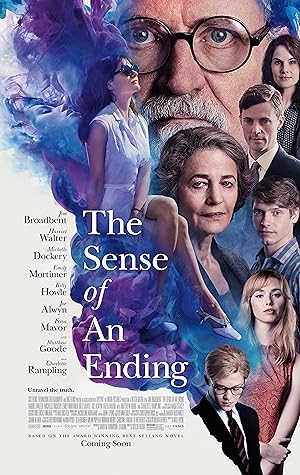I saw previews for The Sense of an Ending and was intrigued by the premise: comparing and contrasting a youthful memory of a pivotal point with newly discovered information and the benefit of age and experience. The cast is filled with spectacularly talented actors, but because the magnificent Charlotte “did not deserve to make the final list” Rampling does not deserve my money, I waited until it came out on DVD, and I am glad that I did so.
The Sense of an Ending is an adaptation of a book that I suspect is more amazing than the film. The story follows Jim Broadbent’s character as his solitary routine is disrupted by a distant voice from the past, and it completely unsettles him. The movie toggles between the past and the present, but the main flaw is that the younger half of the cast is not as captivating as the older half. If I am completely honest, I had some trouble keeping all the boys straight, and I was not interested in the self-important teens, which are only slightly more annoying than CW teens. Some actors’ appearances in the past scenes seem disproportionately more significant because of his or her talent than the story actually intends. Why give me Matthew Goode then do basically nothing with him? What a waste.
For instance, Veronica’s brother, played by Edward Holcroft, only has a brief moment alone with the main character, but I thought that the real story was that he was competing with his sister for the same cluster of men and would seduce him because of the way that he delivered his lines. There was more sexual tension between those two than with anyone else in the movie. Actually I felt bad for Veronica because I felt as if there was a subtext that the mother has consistently competed with and undermined her daughter with her friends which was reflected in the family’s odd behavior: the father’s willful cluelessness, her brother’s emulating of his mother’s behavior and Veronica’s reluctance to trust for fear of betrayal, which resulted in dumping the first guy because she thought that he was already compromised. There was some emotionally abusive or dysfunctional Ford family dynamic, which also harmed the mother and made her feel stunted in her ability to emotionally relate to anyone, but younger people. Book readers will have to confirm or deny.
The Sense of an Ending benefits from repeat viewings or perhaps people who read the book. I watched it a second time and discovered significance in seemingly casual remarks such as when the pregnant daughter admonishes her father about writing letters or when his ex-wife is confused about whom he dated, the mother or daughter. What I don’t understand is if the main character has been so emotionally distant after that experience, how did he end up married and still friends with his wife? If he is Broadbent, it makes sense because he is engaging, but as the actual character, it does not.
The Sense of an Ending is really about a character with an inflated ego about the power of his words or his level of importance in other people’s life. Everything interesting is happening around him. He has to jump back into the fray to engage in the world and become a player although initially an awkward one, a second, late life adolescence. Unfortunately this aspect of his character creates a dissonance—he is insignificant, but the entire story is about him while all the real action is occurring to other characters off screen.
The Sense of an Ending features numerous perfect performances by Broadbent, Rampling, Harriet Walter, Emily Mortimer and Michelle Dockery so if you are a fan of any of the actors, you should check the movie out, but others interested in the premise should probably forgo the theatrical experience and just read the book.
Stay In The Know
Join my mailing list to get updates about recent reviews, upcoming speaking engagements, and film news.





